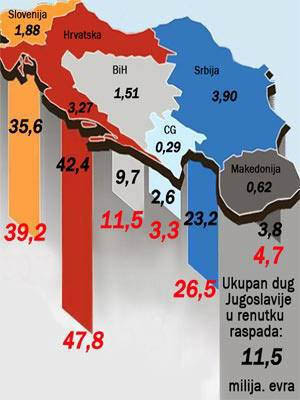
Originalni članek: Yugoslavia and the Betrayal of Democracy
objavljen na spletni strani Global Research v katerem Matthew Cooper analizira vsebino knjige avtorja, češkega ekonomista Jaroslava Vaněka The Participatory Economy: an Evolutionary Hypothesis and a Strategy for Development (1971). Jaroslav Vaněk v knjigi izdani leta 1971 analizira ekonomski sistem v takratni Jugoslaviji v obdobju petdesetih in šestdesetih let.
Po tem,ko sem prečital prispevek v celoti, me je pritegnila ugotovitev, da je razpad Jugoslavije bil natačno orkestriran s strani demokratične Amerike in s pomočjo demokratične zahodne Evrope. Glavno vlogo pri realizaciji tega velikega načrta pa so imeli, tako kot že marsikje drugje po svetu, IMF, nevladne organizacije in seveda domači "pomagači" v vseh republikah. V nadaljevanju objavljam nekaj citatov iz prispevka, ki nam na drug način predstavljajo napore za "osamosvojitev" republik biše Jugoslavije. Po padcu varšavskega pakta je postala vloga Jugoslavije kot tamponske cone med vzhodom in zahodom nepomembna. Na potezi je bil IMF in zahodni kapital.
*
...Once its usefulness as a geopolitical buffer between the West and the Soviet bloc evaporated with the dissolution of Soviet Union itself, the Yugoslav economy was deliberately sabotaged and broken by the political nexus of IMF-managed Western capital. As historian Michael Parentidescribes it, previously Yugoslavia had borrowed from the West in part to expand its domestic consumer production, and previously the IMF had obliged. But one of the preconditions of the IMF loan given to the Yugoslavs in 1989 was the imposition of what, by now, should look like an all-too-familiar prescription: austerity. Public programmes were slashed; wages were frozen; the currency was devalued and the system of worker-managed firms began to fray as their sources of investment began to dry up and as the legal framework which had supported them vanished under IMF ‘restructuring’. These reforms were pushed through at the beginning of the following year, to disastrous effect on the unique Yugoslav economy...
*
Pospešek k hitrejšemu razkosanju je nato dodal predsednik Bush starejši, ko je podpisal Foreign Operations Appropriations Act of 1991, v katerem odpoveduje pomoč katerikoli regiji v Jugoslaviji, ki ji ne bo v šestih mesecih uspelo razglasiti neodvisnost. Cilji tega predsedniškega odloka so bili industrija in državna lastnina, ki so postali interesantni za zahodni kapital. Oportunistični politiki, opogumljeni politično kot tudi ekonomsko, so prispevali svoj delež goriva na grmado.
**
...And the following collapse of Yugoslavia’s now-fraying political institutions was given a hearty push by the Bush Administration in the form of the Foreign Operations Appropriations Act of 1991, which denied aid to any regions of Yugoslavia which failed to declare independence within six months.The targets of this act were Yugoslavia’s industries and state assets, which Western capital interests were eager to acquire. Opportunistic politicians, encouraged both politically and economically to rebel against the Yugoslav government, began fanning the flames of nationalist ressentiment in every corner of the former republic – which already had ample grounds to grow in an economic environment where ordinary folk were now beholden to foreign interests, powerless, jobless, destitute and increasingly desperate...
**
Razpad Jugoslavije je bila tragedija, saj je demokratični idealizem podpiran od Zahoda doživel grobo izdajo taistega Zahoda. Stotisoči mrtvih in 4 miljone razseljenih duš v nekajletnih vojnah predstavljajo to zgodbo na drug način.
***
...The dismantling of Yugoslavia was a tragedy. It was a tragedy in part because of the hollow nature of the democratic idealism upon which the Yugoslav government was depending in the West. And it was a tragedy in part because the West viciously betrayed and stamped out not only the Yugoslavs – of whom over a hundred thousand were murdered and four million driven from their homes in the resulting fratricidal wars over the decade to follow! – but the Yugoslav model as well, which might have been instructive in some ways for political and economic practice in both West and East...
***
Tistim, ki vam angleščina ne predstavlja problem, predlagam, da si prispevek v originali preberete v celoti. Puščam odprto možnost, da se z napisanim ne boste strinjali.

Dec 30, 2014



